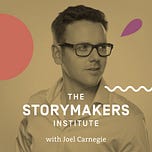Last week, we wrapped up season four of The Storymakers Institute podcast, and what a ride it was: Tracey Spicer told me what she did after her work got ripped off by AI, we ventured into the Congo Basin with Nsah Mala, Jonathan Hirsch told me how growing up in a cult made him a better storyteller, and Meshel Laurie told me why she handed her voice over to a robot.
Scroll down ⬇️ for the goss on who’s coming onto The Storymakers Institute next week - and share this season with your mates.
Lifting the hood »
I love reading your suggestions, thoughts and questions about the series, and I thought I’d answer a reoccurring subscriber question. This one from James: “What goes into making the podcast every week?”
Well, every episode has its own life cycle - from researching topics and reaching out to guests to wrangle interviews (in any possible time zone!), then keeping owl hours or getting up at the crack of dawn to record the conversation - there is so much unseen work involved.
I spend a tonne of time researching and prepping for each episode. I'm constantly reading books, bingeing entire podcast series, watching films, scouring news articles, scrolling feeds – all to really get a handle on the topic, the guest, and their body of work.
Once a guest is booked in, we record the interview via a remote recording studio, then comes editing and post-production. I sink hours into refining each episode to (1) make it sound awesome and (2) to bin all the ums, ahs, and less interesting bits of the tape. Why? Because I value your time.
Then, after that, it's all about packaging the whole thing up for Substack – gathering bios, putting together video content, writing show notes and social media jazz, and dealing with behind-the-scenes admin - so the episode reaches your inbox, Substack app or podcast feed at 6am every Wednesday.
So there you have it: the process behind the creation of the show.
As Dolly Parton once said: "It costs a lot of money to look this cheap!" so I’d like to take the opportunity to thank everyone for listening, especially to all paid subscribers who help keep the lights on.
This show is entirely supported by generous paid subscribers, who value the skill, the craft, and time it takes to create the show, each week. In exchange for making a monthly or annual contribution (either $15 AUD/month or $150 AUD/year), all paid subscribers gain access to full-length weekly episodes and the full show archive, plus bonus episodes and posts behind the paywall.
If you value this show in your life and want to keep the show sustainable and strong - upgrade your subscription to paid. Gift subscriptions also available.
PS: Also if you haven’t rated the show on Apple Podcasts and/or Spotify yet, it takes literally seconds: just click the link and hit the “star” rating button.
Rewind »
I'd like to rewind back to my chat with Belinda Lopez a couple of weeks back. During that interview, we talked about a quote that's been attributed to both the existential French philosopher Albert Camus and the American novelist and short story writer Bernard Malamud. This gem was originally sent to me by one of our paid Substack subscribers (thanks for the inspo, Jane!).
“The purpose of the storyteller is to prevent civilisation from destroying itself.”
There’s probably a PhD’s worth of ideas to unpack from this quote, hence returning to it. It sounds all so wise. But, like… how are we going with that? On a scale of 1-10. Maybe not so well? Could do better? And what does better look like?
A couple of years ago, a New York Times article spoke about storytelling being: “the gateway to truth-telling” helping to “inform our opinions, decision-making and self-views…”.
Some years before that, Brandon Sanderson in the The Way of Kings wrote: “The purpose of a storyteller is not to tell you how to think, but to give you questions to think upon” (I like this one).
Ernest Hemingway, on the other hand, sums up the actual experience of making stories, by saying: “I write one page of masterpiece to ninety-one pages of shit. I try to put the shit in the wastebasket” (also true).
So if the purpose of the storyteller is to prevent civilisation from destroying itself, then what does good storytelling look like to prevent said destruction?
Listen to this episode with a 7-day free trial
Subscribe to The Storymakers Institute with Joel Carnegie to listen to this post and get 7 days of free access to the full post archives.













